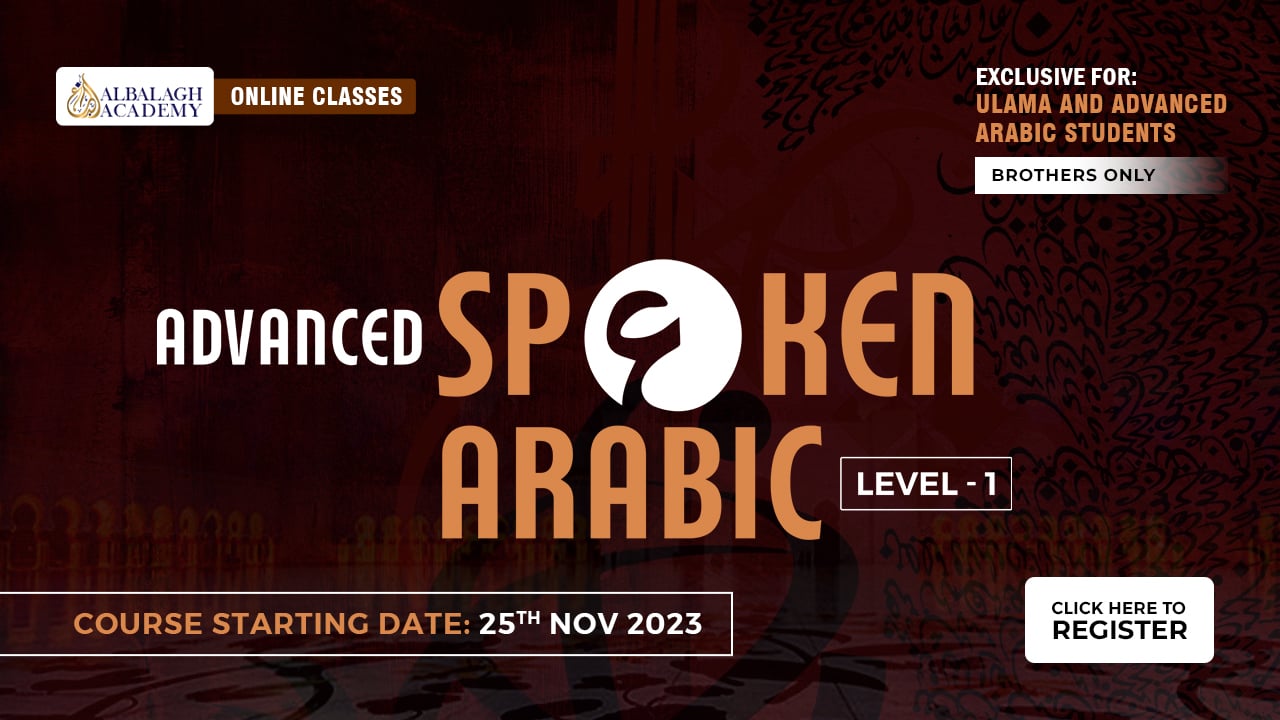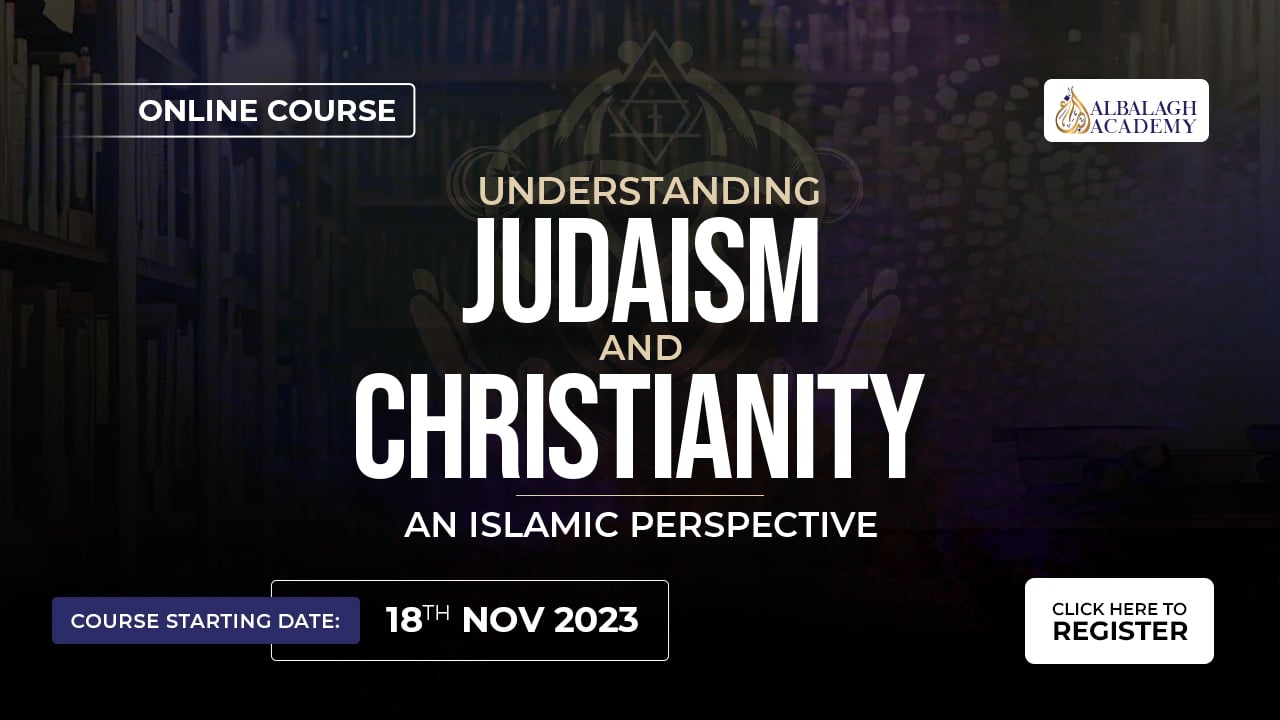Al Takhaṣṣuṣ Fi’l-Tafsīr – Level 1
(Exclusive for Ulama and Alimat)
About The Course
Al Balāgh Takhaṣṣuṣ Fi’l-Tafsīr is a unique course, exclusively tailored for Sharīʿa scholars, ʿUlamā and advanced students of knowledge who wish to seek an opportunity to learn and acquire the essence of Qurānic Tafsīr in order to effectively spread the message of the Qurān in serving the Ummah and to ultimately save the Ummah from the challenges of contemporary socio-juridical, political and contextual issues prevalent amongst Muslim communities. This comprehensively engaging course will provide and upskill learners with tools and practical knowledge needed to bring about praiseworthy change and guide the Ummah for generations to come.
Students who successfully complete the Level 1 course will be eligible for admission in Level 2 based on their performance in Level 1. Each level of this three-tiered programme will equip you with advanced expertise in Tafsir, assisting you in further developing into a Mufassir.
COURSE TEAM

Shaykh Mohammed Amin Kholwadia
(Founder, Darul Qasim, USA)

Shaykh Abdur Raheem Limbada
(Senior Lecturer, Tafseer Raheemi, UK)

Dr Rafaqat Rashid
(Academic Director, Al Balagh Academy, UK)

Shaykh Mustaqeem Shah
(Lecturer, Al Balagh Academy, UK)

Shaykh Haroon Sidat
(Research Associate, Cardiff University, UK)

Shaykh Kamil uddin
(Lecturer, Dar Al Qasim, Chicago, USA)

Mufti Hanif Patel
(Darul-Uloom , U.K & Darul Iftaa Mahmudiyyah, Durban, South Africa)
Mufti Abrar Qasmi
(Director, Al Balagh Academy, UK)
AT A GLANCE
Completely online
Duration: 10 Months
8+ Weekly Hours
Sisters Only
Monday to Thursday: 11AM – 1PM BST
Brothers Only
Friday: 8PM – 10PM BST
Saturday: 1PM – 3PM BST
Sunday: 8PM – 10PM BST
Wednesday: 8PM – 10PM BST
From £24.99 /Month
Enrol Now
Starting Date 23rd May 2021
Course Fee:
Pay in Full:
Pay in 10 Installments:
Extended Deadline
5th June 2021
AlBalagh Scholarship
AlBalagh Scholarship is available for learners who cannot afford the fee.
COURSE TEAM

Shaykh Mohammed Amin Kholwadia
(Founder, Darul Qasim, USA)

Shaykh Abdur Raheem Limbada
(Senior Lecturer, Tafseer Raheemi, UK)

Dr Rafaqat Rashid
(Academic Director, Al Balagh Academy, UK)

Shaykh Mustaqeem Shah
(Lecturer, Al Balagh Academy, UK)

Shaykh Haroon Sidat
(Research Associate, Cardiff University, UK)

Shaykh Kamil uddin
(Lecturer, Dar Al Qasim, Chicago, USA)
Mufti Syed Abrar Qasmi
(Director, Al Balagh Academy, UK)

Mufti Hanif Patel
(Darul-Uloom , U.K & Darul Iftaa Mahmudiyyah, Durban, South Africa)
SYLLABUS
Selected modules will be covered in Level 1 course
- Daurah Tafsīr
- Advanced Qur’ānic Studies
- Contemporary Qur'anic Studies
- Advanced Arabic Studies
- Western studies
- Skills
Tafasir Books
1
Anwar al-Tanzil wa-Asrar al-Ta'wil AKA Tafsir al-Baydawi
Anwar al-Tanzil wa-Asrar al-Ta'wil AKA Tafsir al-Baydawi
2
Tafsir al-Qurtubi
Tafsir al-Qurtubi
3
Ta'wilat Ahl As Sunnah – Tafsir Al Maturidi
Ta'wilat Ahl As Sunnah – Tafsir Al Maturidi
4
Tafsir Abi Al Saud
Tafsir Abi Al Saud
5
Mafatih al-Ghayb AKA al-Tafsir al-Kabir
Mafatih al-Ghayb AKA al-Tafsir al-Kabir
6
Al Tafsir al Baseet – Al Imam Al Wahidi
Al Tafsir al Baseet – Al Imam Al Wahidi
7
Maani al Quran wa Irabuhu Lil Zujaj
Maani al Quran wa Irabuhu Lil Zujaj
8
Al-Durr Al-Manthur Fi Tafsir Bil-Ma'thur
Al-Durr Al-Manthur Fi Tafsir Bil-Ma'thur
9
Tafsīr al-Qurʾān al-ʿAẓīm (Tafsīr Ibn Kathir)
Tafsīr al-Qurʾān al-ʿAẓīm (Tafsīr Ibn Kathir)
10
Rūh al-Ma'ānī fī Tafsīri-l-Qur'āni-l-'Aẓīm wa Sab'ul-Mathānī
Rūh al-Ma'ānī fī Tafsīri-l-Qur'āni-l-'Aẓīm wa Sab'ul-Mathānī
11
Tafsīr al-Ṭabarī
Tafsīr al-Ṭabarī
12
Nazm al-durar fi tanasub al-ayat wa-al-suwar
Nazm al-durar fi tanasub al-ayat wa-al-suwar
13
Ahkam al-Quran Lil Jassas
Ahkam al-Quran Lil Jassas
14
Tafsir al-Mazhari
Tafsir al-Mazhari
15
Tafsīr al-Jalālayn
Tafsīr al-Jalālayn
16
I'rab al Quran Wa Bayanuhu
I'rab al Quran Wa Bayanuhu
17
Mahasin al Taweel Lil Qasmi
Mahasin al Taweel Lil Qasmi
18
Tafsir Al Manar
Tafsir Al Manar
19
Ma'ariful Qur'an
Ma'ariful Qur'an
20
Fi Zilal al-Qur'an
Fi Zilal al-Qur'an
21
Tafsir al-Tahrir wa'l-Tanwir
Tafsir al-Tahrir wa'l-Tanwir
22
Adwa Al-Bayan
Adwa Al-Bayan
23
Bayan al Quran
Bayan al Quran
24
Al Tafsir al Munir
Al Tafsir al Munir
25
Al-Tafsir al-Waseet by Muhammad Sayyid Tantawy
Al-Tafsir al-Waseet by Muhammad Sayyid Tantawy
26
Safwat al-Tafasir
Safwat al-Tafasir
27
Tafsīr al-Kashaf
Tafsīr al-Kashaf
1
Manāhil al-ʿIrfān fī ʿUlūm al-Qurān (Muhammad al-Zarqani)
2
Uṣul al-Tafsīr
3
Study of al-Itqān fī ʿUlūm al-Qur’ān (Jalāl al-Dīn al-Suyūṭī)
4
Uṣūl al-Tafsīr- Study of al-Fawz al-Kabīr and Muqaddama of Ibn
5
The Sciences of Qur’an (Ulûm Al-Qur’an)
6
Al-Tafsir Wal-Mufassirun
1
The Qur’an and Modern Science
2
The Qur'an, Orientalism and Modern Thoughts
3
The Qur’an, The Bible & History
1
Al-Balagha Al-Wadiha
2
Advanced Arabic Writing
3
Advanced Spoken Arabic
1
Islamic Worldviews
2
Western Philosophy & Islam
3
Atheism And Islam
1
Critical Thinking and Problem Solving
2
Muslim Leadership Training
3
Chaplaincy, Pastoral Care and Counselling
4
Presentation Skills
Course Overview
Al Balāgh Takhaṣṣuṣ Fi’l-Tafsīr is a unique course, exclusively tailored for sharīʿa scholars, ʿulamā and advanced students of knowledge who wish to seek an opportunity to learn and acquire the essence of Quranic Tafsīr in order to effectively spread the message of the Qurān in serving the Ummah and to ultimately save the Ummah from the challenges of contemporary socio-juridical, political and contextual issues prevalent amongst Muslim communities. This comprehensively engaging course will provide and upskill learners with tools and practical knowledge needed to bring about praiseworthy change and guide the Ummah for generations to come.
Al Balāgh Takhaṣṣuṣ Fi’l-Tafsīr course will lay emphasis on achieving the following objectives for learners: Explore all-essential concepts, ideas, theories, application principles with respect to Islamic Studies, Ulûm ul Quran, Quranic Sciences and other major Qur'anic themes as described by contemporary scholars.
Read more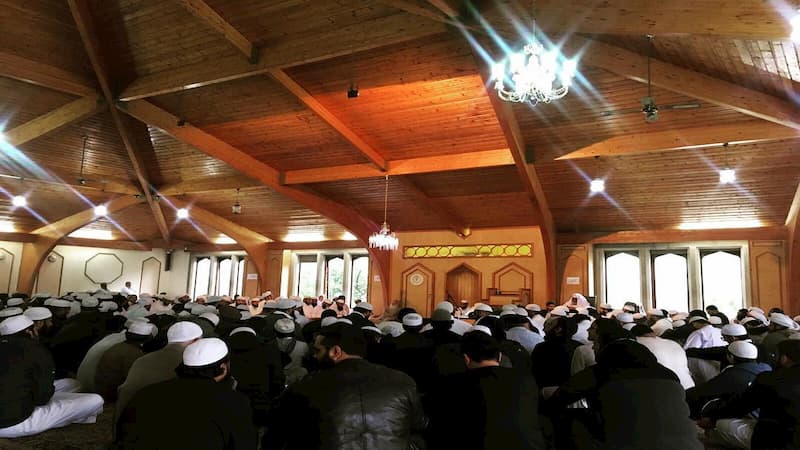

Learning Objectives
By The End Of The Three-Tiered Programme, Students Will:
- Learn and become more adept at all facets of the Classical Quranic Literature with due diligence on understanding and analysing Quranic Translations in English and various other languages.
- Produce a new generation of academically qualified scholars in the field of Quranic Studies, Quranic Exegesis, Ulûm ul Quran, the Sciences of the Quran, who will be leading academic expert Scholars specialised in this area to convey the message of the glorious Quran to the Muslim Ummah effectively.
- Enable learners to respond, analyse and resolve challenges in relation to Qur’anic studies such as Orientalism, Scientism and various other contemporary challenges.
- Enable learners to acquire skills, knowledge required to work towards implementing and spreading true Quranic practices which reflect the beauty of the real values and spirit of the Quranic principles and thus create a major impact on Muslim communities.

COURSE DETAILS
ENTRY REQUIREMENT
The aspiring students should either:
- Have completed Alimiyyah Course from a recognised institute and Have Ijazah Sanad.
- Have good knowledge and understanding of Arabic and English language.
- Must be 18 years old or above.
The programme is exclusively tailored for advanced students, to provide them with an opportunity to develop advanced expertise in various books of Tafsir in a considerably shorter period and from the comfort of their homes. Currently, we are accepting enrollments for Level 1, and will launch the next two levels consequently insha’Allah. If you have any prior qualification in the field, then kindly contact our communication team on +44 7397 903767 to save your interest for our Level 2 or Level 3 courses.
This Al Takhassus Fi’l Tafsir programme has been divided into 3 levels. Each level will be about 10 months long. The details of the Level 1 classes are listed below;
Orientation Day: Sunday, 23rd May 2021
Live Class Timing
Following is the weekly online classes schedule
- Fridays: 8:00PM – 10:00PM GMT
- Saturdays: 11:30AM – 2:30PM GMT
- Sundays: 7:00PM – 10:00PM GMT
- Monday to Thursday: 11:00AM – 1:00PM GMT
NOTE: There will be 9-10 live online classes per week. Students will have the complete flexibility to select any classes per week according to your convenience and your preference subjects. Our academic support team will guide you in terms of selecting core courses and optional courses. (Recommended a minimum of 5 classes per week)
Attendance Policy
All the modules are divided into two categories:
- Core Modules
- Optional Module
Students should have a minimum of 50% attendance in core courses. Live classes’ attendance is not mandatory for optional courses.
The course will be delivered in a series of live online classes, tutorials, presentation-based lectures, textbook-based traditional lectures, and seminars, all delivered live online. The recordings will be uploaded onto our myAlbalagh student’s learning portal (24/7 Accessibility from a web browser and Mobile App) for students to review and revise at their own pace and convenience.Our distinctive approach relates to our three-level structure, making it more holistic and flexible.
The Programme has been divided into three levels:
- Takhaṣṣuṣ Fi’l-Tafsīr – Level 1
- Takhaṣṣuṣ Fi’l-Tafsīr – Level 2
- Takhaṣṣuṣ Fi’l-Tafsīr – Level 3
The course will be taught exclusively by leading Shariah scholars and qualified Mufassirun using online technology.
- Core Courses & Elective Courses: In every Level, there will be Core and Elective modules/ Chapters of books. In terms of the timing of live classes, the schedule of live classes is flexible with around 10 live class options per week (See the schedule section for detail). Students can select a minimum of 4 to 5 classes based on their convenience and time zone. You may also apply for exemption from core courses if you can demonstrate the completion of these modules/subjects before, or have the required level of knowledge.
- Flexible Study Hours: Students are expected to spend an average of 8-10 hours per week to meet the study requirements and complete the course without compromising their personal and professional commitments.
- Attendance Requirement: Attendance (a minimum of 50% attendance) is mandatory in the live online sessions of all core modules. However, attendance is not required for optional modules and students can complete the optional modules by attaining minimum pass marks in the assessments.
- 24/7 Access to Video Recordings: Video recordings for every live session will be available within 48 hours on students’ course dashboard for revision and convenience. Students will get lifetime access to recordings.
- Mobile App: Students can get access to the course content on the go, using my albalagh mobile app and complete the coursework from anywhere and at any time.
- Exemption: Students with advanced knowledge or experience in the related subjects/books can apply for exemption for certain modules and select another level book.
We understand that most of our students have busy lives and managing family and professional commitments can be tough. Therefore, Al Balagh designed a flexible and structured learning model for passionate students like you to ensure that you can join this sacred journey of Islamic learning without compromising your other commitments. After successful enrollment, our academic support team will guide and advise you on module selection, class timings, and study requirements as and when required.
The goal is simple: To prepare a new generation of academically qualified sharīʿa scholars in Qur’anic studies who will have advanced knowledge, understanding and skills conveying the divine message of the glorious Quran to today’s multicultural, heterogeneous and multidimensional society.
There is a shortage of expert academically qualified sharīʿa scholars, ʿulama with expertise in advanced knowledge in Quranic Studies and because of this the true message of the glorious Quran, which is pivotal to understanding and strengthening Islam is not getting its message across the wider Muslim community effectively. Therefore, we at Al Balagh Academy, have designed a unique course which aims at empowering learners with advanced knowledge of Qur’anic studies and to help them acquire contemporary skills needed to guide the Ummah in the right direction.
Frequently Asked Questions
What are the foundational components of the Alimiyyah Programme, including its Curriculum Streams? Furthermore, could you elaborate on the distinctive avenues the program provides for spiritual growth?
The essential building blocks of the Alimiyyah program consist of:
- Levels:
The Alimiyyah programme is structured into four levels, each comprising multiple semesters. These levels form the foundational structure of the program, guiding students through increasingly advanced studies.
- Semesters:
A semester is a defined period of academic study, typically lasting around six months, during which students engage in focused study. Each level contains multiple semesters, providing a structured framework for progression. With two semesters per year, students advance through the program systematically.
- Modules:
Modules represent individual subjects or classes within each semester. These modules cover diverse topics such as Arabic Grammar, Fiqh, Quran Studies, Hadith Studies, and others.
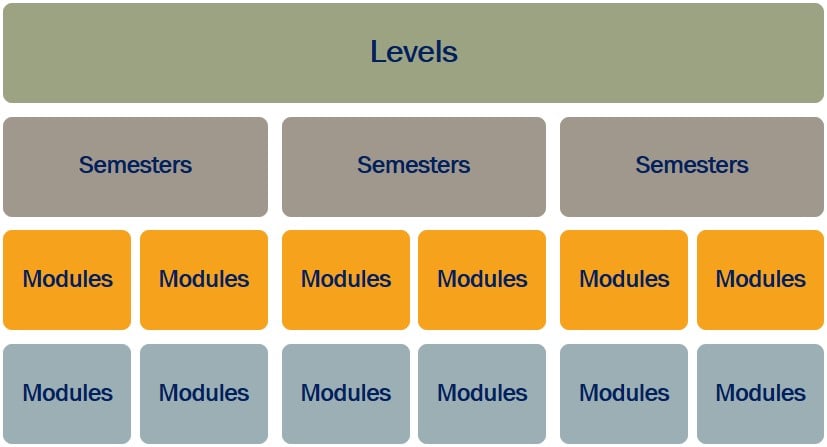
(A suggestive depiction of levels, semesters, and modules)
Curriculum Streams:
Curriculum streams are dedicated streams within the following list of disciplines, consisting of Islamic Studies and Arabic-centric subjects. Each curriculum stream comprises multiple modules, and each level of the Alimiyyah programme features a balanced dedication of modules from each stream.
Streams:
- Aqidah & Islamic Theology
- Quranic Studies
- Hadith Studies
- Fiqh & Contemporary Fiqh Studies
- Arabic Language*
- Seerah and Islamic History
- Logic (Mantiq)
- Tazkiyah Studies
- Tajwid & Hifz
- Western Studies
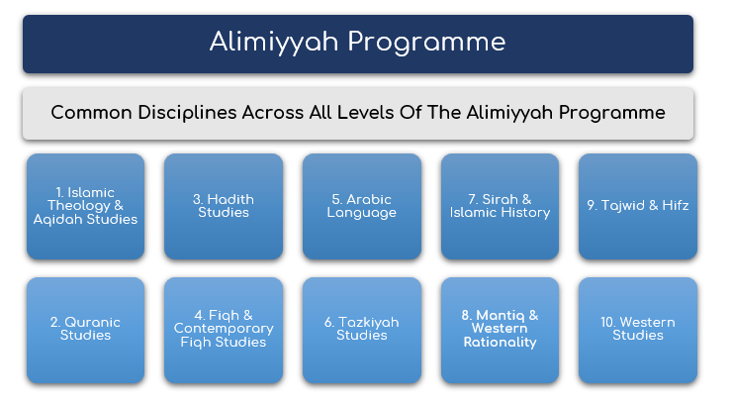
(Curriculum Stream of the Alimiyyah Programme)
* As a prerequisite before joining the Alimiyyah Programme, students are expected to know the Arabic alphabet & be able to read the Qur’an fluently.
Opportunities for Spiritual Growth:
Additionally, our program features flagship Tazkiyah-centric modules, meticulously designed to suit the diverse backgrounds and learning styles of our students. These modules integrate a harmonious blend of traditional wisdom and contemporary methodologies, facilitating not only the acquisition of knowledge but also the cultivation of spiritual well-being. By offering personalized guidance and resources, we aim to nurture a profound understanding of spirituality, enabling students to embark on a transformative journey towards holistic Islamic education and personal enlightenment.
Do both full-time and part-time students need to complete all four levels of the Alimiyyah program? Additionally what sets these two student types apart from each other?
Yes, whether a student is full-time or part-time, they all have to complete all four levels to finish their Alimiyyah program.
The difference between the two types of students lies in the duration of their completion. A part-time student completes their Alimiyyah in 16 semesters, spanning across 8 years, whereas a full-time student completes it in 10 semesters, spanning across 5 years.
- Regarding the difference between the 2 types of students:
For Full-Time students: the Alimiyyah Foundation, spanning two semesters; the Alimiyyah Intermediate, covering three semesters; the Alimiyyah Advanced, also comprising three semesters; and finally, the Daurah Hadith, which spans two semesters. Thus coming to a total of 10 semesters completed in 5 years.
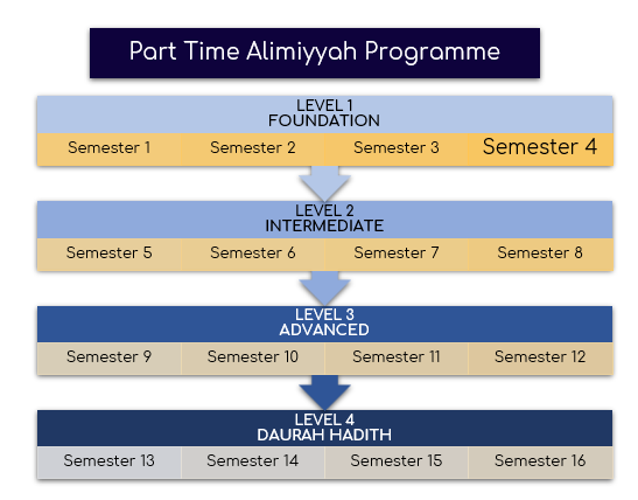
(Full-Time Alimiyyah Programme Track)
- For Part-Time students: the Alimiyyah program includes four semesters each for the Alimiyyah Foundation, Alimiyyah Intermediate, Alimiyyah Advanced, and Daurah Hadith, totaling 16 semesters completed over 8 years.
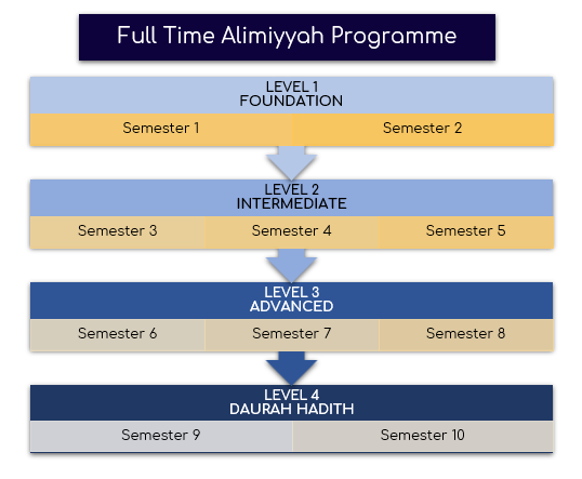
(Part-Time Alimiyyah Programme Track)
Why are full-time students able to complete their Alimiyyah program sooner than part-time students? Do both types of students cover the same modules in their program or do full-time students cover more, thus making their Alimiyyah more comprehensive?
Full-time students are able to complete their Alimiyyah program sooner than part-time students because they commit to a larger number of weekly hours for modules. Consequently, they cover more modules in a single semester.
Regarding the types of modules covered by the 2 different types of students, both types of students cover the same modules and content in their Alimiyyah Programme. We maintain consistency across both full-time and part-time students, ensuring that the syllabus remains uniform regardless of the mode of study.
How are the classes delivered? Additionally, is there any opportunity for direct interaction with scholars?
Classes are delivered live online and include a mix of tutorials, presentation-based lectures, textbook-based traditional lectures, seminars, and workshops. Recordings of these sessions are made available on DUA student’s learning portal for 24/7 access from both web browsers and the Mobile App.
Regarding direct interaction, Yes, students have the opportunity to join Al Balagh's Exclusive annual residential camp. This optional component allows for spiritual development through direct interaction with world-renowned scholars.
I think I’m at an advanced level as I have completed it partially in the past. What is the way forward?
The programme is exclusively tailored to provide students with an opportunity to develop advanced expertise in Islamic Sciences in a short period.
Currently, we are accepting applications for Level 1, but If you are interested in Level 2 or Level 3 and have prior qualification in the field based on prior study history in the Alimiyyah or Arabic programme from elsewhere, then kindly include information of your prior study subjects history in detail and attach the transcripts in the application. After receiving your application, our admission team will make a decision based on your merits and also arrange an assessment meeting after your enrollment to get you enrolled in the correct level/year of Alimiyyah Programme.
How long does it take for an advanced student to receive a decision on which level will be offered?
The final decision on which level will be offered, based on your assessment and prior examination record, can take weeks to complete due to the high influx of students during our enrollment weeks. Therefore, we encourage all students to apply as soon as possible to ensure timely processing of their applications.
I saw the timings on the website and I’m confused if it will suit my schedule/timezone. What do I do?
The timings listed on the website are primarily for beginner-level classes. However, for advanced students, class timings may vary and can be scheduled anywhere from 10 am to 9 pm UK time on Saturdays and Sundays. A more specific timetable will be shared closer to the launch date. Therefore, we recommend maintaining flexibility in your expectations regarding class timings.
If you find yourself unable to enroll in all the modules offered to you, there's no need to worry. You should select only those modules for which you can ensure a minimum of 50% live attendance. Modules where this commitment isn't feasible can be postponed to future semesters.
It's important to note that depending on the number of modules you choose to take per semester, your overall trajectory for completing the Alimiyyah programme will be affected. Therefore, we advise all students to carefully consider their module selection and its impact on their academic journey.
How are advanced classes determined in the Alimiyyah programme, and how does course selection work each semester?
Advanced classes in the Alimiyyah programme are suggested based on your proficiency assessment conducted during a meeting with the Evaluation & Assessment Team. Each semester offers Core and Elective Courses. The Evaluation & Assessment Team will provide guidance on course selection after thoroughly assessing your profile. Additionally, students have the opportunity to apply for exemption from core courses if they can demonstrate prior completion of these courses or possess the necessary level of knowledge.
I can't take all my classes on weekends. Can I draw some classes from weekdays?
Apologetically No. Students must remain in their designated track, either Weekend or Weekday, and are not permitted to mix classes between the two tracks. However, it is possible to switch tracks entirely, meaning a student who initially enrolled in the weekday track but wishes to shift to the weekend track can do so. However, such a shift must be done as soon as possible. Additionally, students should be aware of the starting months for each track:
- Weekday tracks start in February and September of every year
- Weekend tracks start in November and May of every year
(However, please note that occasional changes may occur in the launch dates. For the most recent launch dates or any updates, please feel free to contact our team for assistance.)
If students intend to switch from one track to another, they must do so at a time when the new semester for the intended track is set to begin.
Is the programme suitable for those unable to attend live sessions?
Unfortunately, the program does not accommodate students who are entirely unable to attend live sessions. However, all live sessions are meticulously recorded and promptly uploaded onto the DUA learning portal for convenient access. It is imperative for students to maintain at least 50% live attendance as we do not provide provisions for students who solely rely on recordings without any live participation or presence in the class. We strongly encourage and deem it necessary for students to have active participation and presence in live sessions, considering the sacredness and nature of the studies involved.
How many study hours do we have to dedicate as a part-time or a full-time student?
PART-TIME STUDENTS: For part-time students, we advise allocating specific hours per week / weekend for live classes. Additionally, we suggest dedicating additional time for revision and self-study.
- It's essential to recognize that each student possesses unique strengths and abilities, so their required study hours may vary accordingly.
|
Level |
Live Classes per week/weekend |
Revision & Self-Study |
|---|---|---|
|
1. (Alimiyyah Foundation) |
8-10 hrs |
5 hrs approximately |
|
2. (Alimiyyah Intermediate) |
15+ hrs |
5-7 hrs approximately |
|
3. (Alimiyyah Advanced) |
15+ hrs |
5-7 hrs approximately |
|
4. (Daurah Hadith) |
15+ hrs |
5-7+ hrs approximately |
FULL-TIME STUDENTS: For full-time students, we advise allocating specific hours per week / weekend for live classes. Additionally, we suggest dedicating additional time for revision and self-study.
- It's essential to recognize that each student possesses unique strengths and abilities, so their required study hours may vary accordingly.
|
Level |
Live Classes per week/weekend |
Revision & Self-Study |
|---|---|---|
|
1 (Alimiyyah Foundation) |
18-20 hrs |
7+ hrs approximately |
|
2 (Alimiyyah Intermediate) |
20+ hrs |
7-9 hrs approximately |
|
3 (Alimiyyah Advanced) |
20+ hrs |
7-9 hrs approximately |
|
4 (Daurah Hadith) |
15+ hrs |
10+ hrs approximately |
What are the exam categories on which my evaluation will be done?
Examinations can fall into 1 of 2 categories, depending on the discretion of the teacher and the subject type.
1) Self-Paced examinations: Students can start and finish the exam whenever they want within the set time frame. This means that you can take as much time as you need to complete the exam, or you can complete it quickly if you feel confident.
2) Timed examinations: Students shall be given a fixed amount of time to complete the exam. In timed examinations, students must manage their time carefully in order to complete all the questions within the allotted time frame. The exam is usually proctored and sufficient time shall be given for attempting the exam.
Here are further details:
- Assessments 1 & 2:
Online and self-paced assessments for Assessments 1 and 2 are conducted without live written or live verbal tests. These assessments are administered through the student Learning Management System (LMS) by the examination and administrative team. Students typically have an average of 3-4 weeks after the release date to attempt the assessments.
Syllabus Demarcation:
- The syllabus for Assessment 1 covers material from Week 1 to Week 5, though this timeline may slightly vary according to instructor discretion.
- Similarly, the syllabus for Assessment 2 encompasses material from Week 6 to Week 10, with potential variations based on instructor discretion.
Percentage Weightage Allocation:
- In terms of weightage, Assessment 1 accounts for 15% of the overall grade,
- While Assessment 2 carries a weightage of 25%.
2. For Final Exams:
For Final Exams, the examinations will be conducted online, live, and proctored. These exams are administered through the student Learning Management System (LMS) by the examination and administrative team.
Students are allotted an average of 2-3 hours per exam paper to attempt their exams in a proctored environment.
It's important to note that the camera must be turned on for the entire duration of the exam. Therefore, students need to have access to a camera and adequate audio for the exam.
Syllabus Demarcation:
The syllabus for the Final Exam covers material from Week 11 until the Concluding Week of the semester.
Percentage Weightage Allocation:
In terms of weightage, the Final Exam carries a significant weight of 60% towards the overall grade.
What are the attendance requirements and policies at the academy?
Attendance is crucial for success in our programs. Here's a brief overview of our attendance policies:
-
- Regular Attendance: We expect and encourage regular attendance for all classes. Attendance is recorded and factors into evaluations of responsibility, participation, and progress.
- Unauthorized Absences:
-
- Short-term: Missing class for two consecutive weeks without approval may result in temporary access revocation (temporary removal of the student's access to classes, course materials, LMS, or other educational resources until the issue is resolved).
- Extended: Four weeks of continuous unapproved absence leads to enrollment suspension. Re-admission is required to continue studies.
- Authorized Absences: For any planned absences, prior authorization is needed. Notify your support group in advance with valid reasons and necessary documentation.
- Subject-wise Attendance: A minimum of 50% live class attendance is required per subject to be eligible for final exams. This policy is strictly enforced, with regular attendance audits conducted by the administrative team to ensure compliance.
- Semester-wise Excused Absences: The policy regarding allowed excused absences varies based on the academic level of the students enrolled in the program.
- Level 1 students are permitted up to 50% excused absences,
- Level 2 students up to 30%, and
- Level 3 students up to 20%.
It's important to note that exceeding these allowable absences may result in disciplinary action being taken by higher management. This policy is in place to ensure that students maintain consistent attendance and engagement with their teachers and studies throughout their academic journey.
Emergency Absences: In emergencies, inform your support group/admin as soon as possible to make necessary accommodations and keep your academic progress on track.
When do I receive the Certificate/Ijazah?
The Alimiyyah programme is divided into 4 levels.
Upon successful completion of the first level, students will be awarded:
الشهادة الثانوية العامة في العلوم الإسلامية واللغة العربية
Upon successful completion of the second level, students will be awarded:
الشهادة الثانوية الخاصة في العلوم الإسلامية واللغة العربية
Upon successful completion of the third level, students will be awarded:
الشهادة العالية في العلوم الإسلامية واللغة العربية
Upon successful completion of the final level, students will be awarded:
الشهادة العالمية و الإجازة العالية في العلوم الإسلامية
When will I have access to the learning portal?
Upon successful enrollment, you will get access to DUA, Al Balagh Academy’s advanced online learning portal. Login details and important contact information will be provided to your registered email address. We recommend joining classes from a laptop/desktop computer for better visibility and learning experience.
Student access is of 2 types:
- Main class/batch access:
- Students get access to their batch's main class on the LMS within 24-72 hours.
- This section of the LMS includes various policies and guidelines essential for every student to read through, understand, and acknowledge.
- Module access:
- The second access type is for the specific modules for the semester that students have registered for.
- Every module will have its own access point, where class links, session summaries, notes, presentations, etc., will be uploaded as the weeks go by. This access is given after the orientation session week concludes.
Orientation session week: There will be an orientation week organized in the first week of the Programme to make students comfortable with the LMS platform, programme structure, schedule, instructors and peers. All support materials like the LMS Guide, Student Guidelines Handbook etc will be uploaded by the admins on the LMS for easier understanding.
Additionally, students enrolled in the Alimiyyah Programme will maintain access to their modules and related information on the Learning Management System (LMS) throughout their enrollment period. However, should a student withdraw or become unenrolled for the semester, access to their previous modules will be discontinued.
DUA - Darul Uloom AlBalagh
Can I access the course content at any time? And Is there a mobile app for accessing my courses?
The recordings of live sessions are uploaded onto our DUA student’s learning portal, providing 24/7 accessibility from both a web browser and the Al Balagh Academy Mobile App, enabling students to review and revise at their own pace and convenience.
Regarding a mobile App: Absolutely! We've got you covered for on-the-go learning with our newly updated mobile app. Gain maximum flexibility in your learning journey by accessing your courses anytime, anywhere. Simply click on the links below to download the latest Al Balagh Academy App tailored to your device:
- For Android users: Download from the Google Play Store
- For iOS users: Download from the App Store
Dive into a world of convenient and accessible learning today!
Do we have WhatsApp groups for communication?
Certainly! We've established a dedicated Student Support Group on WhatsApp to serve as your primary communication channel throughout your journey with us.
Following your Orientation week and completion of class selection, you'll be automatically added to your respective Module-wise "Groups" on the DUA Learning Portal. These groups will provide you with invaluable support and connectivity with fellow students, ensuring a smooth and enriching learning experience.
What is the structure of the onboarding programme?
Kindly note that we will be following these steps for completing the Al Balāgh Online ʿĀlimiyyah Programme Student Onboarding (after the official start date).
Step 1: Creation of WhatsApp Personal Support Group: A WhatsApp Personal Support Group will be established, with select members of the admin team added to assist you.
Step 2: Schedule Sharing: Students will be provided with their schedule based on the batch they have selected for enrollment.
Step 3: Access Provision: Upon schedule sharing, module-wise access will be granted. Modules will become visible on the DUA portal (https://dua.albalaghacademy.org/user_dashboard) within 1-2 days after the schedule has been shared.
Step 4: Module-Wise Groups: Module-specific groups will be available within the portal for each class. Students are encouraged to join these groups for class-related discussions after gaining access to their respective classes.
Support and Queries: Should you have any inquiries regarding the enrollment process or require assistance, feel free to reach out immediately within your support groups.
Scholarship Support: Al Balagh Academy values seekers of knowledge more than anything. Please visit here to apply for a scholarship. Our team will assess your application and respond in 2-3 working days.
What is the mentoring programme and who can participate in it?
We understand that pursuing Alimiyyah studies can present various challenges, despite the presence of dedicated support groups within our institution. Therefore, we take an extra step by offering individualized mentoring to ensure that our students receive the assistance they need to thrive academically, personally and spiritually. The mentoring programme is designed specifically for our Alimiyyah students, offering dedicated mentors throughout their semesters. These mentors provide personalized advice and guidance to students as they navigate through their academic journey.
Additionally, there are no additional fees required for accessing mentoring services. Mentoring support is included as part of your enrollment in the Alimiyyah programme.
The areas in which the mentors can assist their mentees are as follows:
In today's fast-paced and demanding academic environment, ensuring the success and well-being of our students is a top priority.
- Mentors offer guidance on time management and coping strategies, reducing the risk of burnout and dropout rates.
- One-to-one mentoring provides personalized support, aiding students in navigating challenges more effectively.
- Mentoring sessions offer a confidential space for students to discuss concerns and learn healthy coping mechanisms.
- Mentors provide valuable insights for spiritual development, benefiting students in their educational journey.
- Guidance from mentors empowers students to overcome obstacles and stay committed to their academic pursuits.
Will I get notification for live sessions?
You will be able to view all course wise live session details including joining links on your DUA Portal calendar(students are advised to join classes from the LMS directly). If you find any difficulty with the link/calendar students are advised to contact their respective support groups; where our dedicated support team will ensure that their problem gets resolved at the earliest.
Regarding General Help:
1) If you have questions about your ongoing classes, assessment matters, or IT/technical issues, please reach out to us through your respective Support groups only. (Please Note: It may take 2-3 days for our team to resolve the issue due to the volume of students.)
2) If you're interested in joining a different course/programme and need information, please get in touch with our admission team:
Email support: [email protected]
WhatsApp Support: http://wa.me/447946835804
What are the foundational components of the Alimiyyah Programme, including its Curriculum Streams? Furthermore, could you elaborate on the distinctive avenues the program provides for spiritual growth?
The essential building blocks of the Alimiyyah program consist of:
- Levels:
The Alimiyyah programme is structured into four levels, each comprising multiple semesters. These levels form the foundational structure of the program, guiding students through increasingly advanced studies.
- Semesters:
A semester is a defined period of academic study, typically lasting around six months, during which students engage in focused study. Each level contains multiple semesters, providing a structured framework for progression. With two semesters per year, students advance through the program systematically.
- Modules:
Modules represent individual subjects or classes within each semester. These modules cover diverse topics such as Arabic Grammar, Fiqh, Quran Studies, Hadith Studies, and others.

(A suggestive depiction of levels, semesters, and modules)
Curriculum Streams:
Curriculum streams are dedicated streams within the following list of disciplines, consisting of Islamic Studies and Arabic-centric subjects. Each curriculum stream comprises multiple modules, and each level of the Alimiyyah programme features a balanced dedication of modules from each stream.
Streams:
- Aqidah & Islamic Theology
- Quranic Studies
- Hadith Studies
- Fiqh & Contemporary Fiqh Studies
- Arabic Language*
- Seerah and Islamic History
- Logic (Mantiq)
- Tazkiyah Studies
- Tajwid & Hifz
- Western Studies

(Curriculum Stream of the Alimiyyah Programme)
* As a prerequisite before joining the Alimiyyah Programme, students are expected to know the Arabic alphabet & be able to read the Qur’an fluently.
Opportunities for Spiritual Growth:
Additionally, our program features flagship Tazkiyah-centric modules, meticulously designed to suit the diverse backgrounds and learning styles of our students. These modules integrate a harmonious blend of traditional wisdom and contemporary methodologies, facilitating not only the acquisition of knowledge but also the cultivation of spiritual well-being. By offering personalized guidance and resources, we aim to nurture a profound understanding of spirituality, enabling students to embark on a transformative journey towards holistic Islamic education and personal enlightenment.
Do both full-time and part-time students need to complete all four levels of the Alimiyyah program? Additionally what sets these two student types apart from each other?
Yes, whether a student is full-time or part-time, they all have to complete all four levels to finish their Alimiyyah program.
The difference between the two types of students lies in the duration of their completion. A part-time student completes their Alimiyyah in 16 semesters, spanning across 8 years, whereas a full-time student completes it in 10 semesters, spanning across 5 years.
- Regarding the difference between the 2 types of students:
For Full-Time students: the Alimiyyah Foundation, spanning two semesters; the Alimiyyah Intermediate, covering three semesters; the Alimiyyah Advanced, also comprising three semesters; and finally, the Daurah Hadith, which spans two semesters. Thus coming to a total of 10 semesters completed in 5 years.

(Full-Time Alimiyyah Programme Track)
- For Part-Time students: the Alimiyyah program includes four semesters each for the Alimiyyah Foundation, Alimiyyah Intermediate, Alimiyyah Advanced, and Daurah Hadith, totaling 16 semesters completed over 8 years.

(Part-Time Alimiyyah Programme Track)
Why are full-time students able to complete their Alimiyyah program sooner than part-time students? Do both types of students cover the same modules in their program or do full-time students cover more, thus making their Alimiyyah more comprehensive?
Full-time students are able to complete their Alimiyyah program sooner than part-time students because they commit to a larger number of weekly hours for modules. Consequently, they cover more modules in a single semester.
Regarding the types of modules covered by the 2 different types of students, both types of students cover the same modules and content in their Alimiyyah Programme. We maintain consistency across both full-time and part-time students, ensuring that the syllabus remains uniform regardless of the mode of study.
How are the classes delivered? Additionally, is there any opportunity for direct interaction with scholars?
Classes are delivered live online and include a mix of tutorials, presentation-based lectures, textbook-based traditional lectures, seminars, and workshops. Recordings of these sessions are made available on DUA student’s learning portal for 24/7 access from both web browsers and the Mobile App.
Regarding direct interaction, Yes, students have the opportunity to join Al Balagh's Exclusive annual residential camp. This optional component allows for spiritual development through direct interaction with world-renowned scholars.
I think I’m at an advanced level as I have completed it partially in the past. What is the way forward?
The programme is exclusively tailored to provide students with an opportunity to develop advanced expertise in Islamic Sciences in a short period.
Currently, we are accepting applications for Level 1, but If you are interested in Level 2 or Level 3 and have prior qualification in the field based on prior study history in the Alimiyyah or Arabic programme from elsewhere, then kindly include information of your prior study subjects history in detail and attach the transcripts in the application. After receiving your application, our admission team will make a decision based on your merits and also arrange an assessment meeting after your enrollment to get you enrolled in the correct level/year of Alimiyyah Programme.
How long does it take for an advanced student to receive a decision on which level will be offered?
The final decision on which level will be offered, based on your assessment and prior examination record, can take weeks to complete due to the high influx of students during our enrollment weeks. Therefore, we encourage all students to apply as soon as possible to ensure timely processing of their applications.
I saw the timings on the website and I’m confused if it will suit my schedule/timezone. What do I do?
The timings listed on the website are primarily for beginner-level classes. However, for advanced students, class timings may vary and can be scheduled anywhere from 10 am to 9 pm UK time on Saturdays and Sundays. A more specific timetable will be shared closer to the launch date. Therefore, we recommend maintaining flexibility in your expectations regarding class timings.
If you find yourself unable to enroll in all the modules offered to you, there's no need to worry. You should select only those modules for which you can ensure a minimum of 50% live attendance. Modules where this commitment isn't feasible can be postponed to future semesters.
It's important to note that depending on the number of modules you choose to take per semester, your overall trajectory for completing the Alimiyyah programme will be affected. Therefore, we advise all students to carefully consider their module selection and its impact on their academic journey.
How are advanced classes determined in the Alimiyyah programme, and how does course selection work each semester?
Advanced classes in the Alimiyyah programme are suggested based on your proficiency assessment conducted during a meeting with the Evaluation & Assessment Team. Each semester offers Core and Elective Courses. The Evaluation & Assessment Team will provide guidance on course selection after thoroughly assessing your profile. Additionally, students have the opportunity to apply for exemption from core courses if they can demonstrate prior completion of these courses or possess the necessary level of knowledge.
I can't take all my classes on weekends. Can I draw some classes from weekdays?
Apologetically No. Students must remain in their designated track, either Weekend or Weekday, and are not permitted to mix classes between the two tracks. However, it is possible to switch tracks entirely, meaning a student who initially enrolled in the weekday track but wishes to shift to the weekend track can do so. However, such a shift must be done as soon as possible. Additionally, students should be aware of the starting months for each track:
- Weekday tracks start in February and September of every year
- Weekend tracks start in November and May of every year
(However, please note that occasional changes may occur in the launch dates. For the most recent launch dates or any updates, please feel free to contact our team for assistance.)
If students intend to switch from one track to another, they must do so at a time when the new semester for the intended track is set to begin.
Is the programme suitable for those unable to attend live sessions?
Unfortunately, the program does not accommodate students who are entirely unable to attend live sessions. However, all live sessions are meticulously recorded and promptly uploaded onto the DUA learning portal for convenient access. It is imperative for students to maintain at least 50% live attendance as we do not provide provisions for students who solely rely on recordings without any live participation or presence in the class. We strongly encourage and deem it necessary for students to have active participation and presence in live sessions, considering the sacredness and nature of the studies involved.
How many study hours do we have to dedicate as a part-time or a full-time student?
PART-TIME STUDENTS: For part-time students, we advise allocating specific hours per week / weekend for live classes. Additionally, we suggest dedicating additional time for revision and self-study.
- It's essential to recognize that each student possesses unique strengths and abilities, so their required study hours may vary accordingly.
|
Level |
Live Classes per week/weekend |
Revision & Self-Study |
|---|---|---|
|
1. (Alimiyyah Foundation) |
8-10 hrs |
5 hrs approximately |
|
2. (Alimiyyah Intermediate) |
15+ hrs |
5-7 hrs approximately |
|
3. (Alimiyyah Advanced) |
15+ hrs |
5-7 hrs approximately |
|
4. (Daurah Hadith) |
15+ hrs |
5-7+ hrs approximately |
FULL-TIME STUDENTS: For full-time students, we advise allocating specific hours per week / weekend for live classes. Additionally, we suggest dedicating additional time for revision and self-study.
- It's essential to recognize that each student possesses unique strengths and abilities, so their required study hours may vary accordingly.
|
Level |
Live Classes per week/weekend |
Revision & Self-Study |
|---|---|---|
|
1 (Alimiyyah Foundation) |
18-20 hrs |
7+ hrs approximately |
|
2 (Alimiyyah Intermediate) |
20+ hrs |
7-9 hrs approximately |
|
3 (Alimiyyah Advanced) |
20+ hrs |
7-9 hrs approximately |
|
4 (Daurah Hadith) |
15+ hrs |
10+ hrs approximately |
What are the exam categories on which my evaluation will be done?
Examinations can fall into 1 of 2 categories, depending on the discretion of the teacher and the subject type.
1) Self-Paced examinations: Students can start and finish the exam whenever they want within the set time frame. This means that you can take as much time as you need to complete the exam, or you can complete it quickly if you feel confident.
2) Timed examinations: Students shall be given a fixed amount of time to complete the exam. In timed examinations, students must manage their time carefully in order to complete all the questions within the allotted time frame. The exam is usually proctored and sufficient time shall be given for attempting the exam.
Here are further details:
- Assessments 1 & 2:
Online and self-paced assessments for Assessments 1 and 2 are conducted without live written or live verbal tests. These assessments are administered through the student Learning Management System (LMS) by the examination and administrative team. Students typically have an average of 3-4 weeks after the release date to attempt the assessments.
Syllabus Demarcation:
- The syllabus for Assessment 1 covers material from Week 1 to Week 5, though this timeline may slightly vary according to instructor discretion.
- Similarly, the syllabus for Assessment 2 encompasses material from Week 6 to Week 10, with potential variations based on instructor discretion.
Percentage Weightage Allocation:
- In terms of weightage, Assessment 1 accounts for 15% of the overall grade,
- While Assessment 2 carries a weightage of 25%.
2. For Final Exams:
For Final Exams, the examinations will be conducted online, live, and proctored. These exams are administered through the student Learning Management System (LMS) by the examination and administrative team.
Students are allotted an average of 2-3 hours per exam paper to attempt their exams in a proctored environment.
It's important to note that the camera must be turned on for the entire duration of the exam. Therefore, students need to have access to a camera and adequate audio for the exam.
Syllabus Demarcation:
The syllabus for the Final Exam covers material from Week 11 until the Concluding Week of the semester.
Percentage Weightage Allocation:
In terms of weightage, the Final Exam carries a significant weight of 60% towards the overall grade.
What are the attendance requirements and policies at the academy?
Attendance is crucial for success in our programs. Here's a brief overview of our attendance policies:
-
- Regular Attendance: We expect and encourage regular attendance for all classes. Attendance is recorded and factors into evaluations of responsibility, participation, and progress.
- Unauthorized Absences:
-
- Short-term: Missing class for two consecutive weeks without approval may result in temporary access revocation (temporary removal of the student's access to classes, course materials, LMS, or other educational resources until the issue is resolved).
- Extended: Four weeks of continuous unapproved absence leads to enrollment suspension. Re-admission is required to continue studies.
- Authorized Absences: For any planned absences, prior authorization is needed. Notify your support group in advance with valid reasons and necessary documentation.
- Subject-wise Attendance: A minimum of 50% live class attendance is required per subject to be eligible for final exams. This policy is strictly enforced, with regular attendance audits conducted by the administrative team to ensure compliance.
- Semester-wise Excused Absences: The policy regarding allowed excused absences varies based on the academic level of the students enrolled in the program.
- Level 1 students are permitted up to 50% excused absences,
- Level 2 students up to 30%, and
- Level 3 students up to 20%.
It's important to note that exceeding these allowable absences may result in disciplinary action being taken by higher management. This policy is in place to ensure that students maintain consistent attendance and engagement with their teachers and studies throughout their academic journey.
Emergency Absences: In emergencies, inform your support group/admin as soon as possible to make necessary accommodations and keep your academic progress on track.
When do I receive the Certificate/Ijazah?
The Alimiyyah programme is divided into 4 levels.
Upon successful completion of the first level, students will be awarded:
الشهادة الثانوية العامة في العلوم الإسلامية واللغة العربية
Upon successful completion of the second level, students will be awarded:
الشهادة الثانوية الخاصة في العلوم الإسلامية واللغة العربية
Upon successful completion of the third level, students will be awarded:
الشهادة العالية في العلوم الإسلامية واللغة العربية
Upon successful completion of the final level, students will be awarded:
الشهادة العالمية و الإجازة العالية في العلوم الإسلامية
When will I have access to the learning portal?
Upon successful enrollment, you will get access to DUA, Al Balagh Academy’s advanced online learning portal. Login details and important contact information will be provided to your registered email address. We recommend joining classes from a laptop/desktop computer for better visibility and learning experience.
Student access is of 2 types:
- Main class/batch access:
- Students get access to their batch's main class on the LMS within 24-72 hours.
- This section of the LMS includes various policies and guidelines essential for every student to read through, understand, and acknowledge.
- Module access:
- The second access type is for the specific modules for the semester that students have registered for.
- Every module will have its own access point, where class links, session summaries, notes, presentations, etc., will be uploaded as the weeks go by. This access is given after the orientation session week concludes.
Orientation session week: There will be an orientation week organized in the first week of the Programme to make students comfortable with the LMS platform, programme structure, schedule, instructors and peers. All support materials like the LMS Guide, Student Guidelines Handbook etc will be uploaded by the admins on the LMS for easier understanding.
Additionally, students enrolled in the Alimiyyah Programme will maintain access to their modules and related information on the Learning Management System (LMS) throughout their enrollment period. However, should a student withdraw or become unenrolled for the semester, access to their previous modules will be discontinued.
DUA - Darul Uloom AlBalagh
Can I access the course content at any time? And Is there a mobile app for accessing my courses?
The recordings of live sessions are uploaded onto our DUA student’s learning portal, providing 24/7 accessibility from both a web browser and the Al Balagh Academy Mobile App, enabling students to review and revise at their own pace and convenience.
Regarding a mobile App: Absolutely! We've got you covered for on-the-go learning with our newly updated mobile app. Gain maximum flexibility in your learning journey by accessing your courses anytime, anywhere. Simply click on the links below to download the latest Al Balagh Academy App tailored to your device:
- For Android users: Download from the Google Play Store
- For iOS users: Download from the App Store
Dive into a world of convenient and accessible learning today!
Do we have WhatsApp groups for communication?
Certainly! We've established a dedicated Student Support Group on WhatsApp to serve as your primary communication channel throughout your journey with us.
Following your Orientation week and completion of class selection, you'll be automatically added to your respective Module-wise "Groups" on the DUA Learning Portal. These groups will provide you with invaluable support and connectivity with fellow students, ensuring a smooth and enriching learning experience.
What is the structure of the onboarding programme?
Kindly note that we will be following these steps for completing the Al Balāgh Online ʿĀlimiyyah Programme Student Onboarding (after the official start date).
Step 1: Creation of WhatsApp Personal Support Group: A WhatsApp Personal Support Group will be established, with select members of the admin team added to assist you.
Step 2: Schedule Sharing: Students will be provided with their schedule based on the batch they have selected for enrollment.
Step 3: Access Provision: Upon schedule sharing, module-wise access will be granted. Modules will become visible on the DUA portal (https://dua.albalaghacademy.org/user_dashboard) within 1-2 days after the schedule has been shared.
Step 4: Module-Wise Groups: Module-specific groups will be available within the portal for each class. Students are encouraged to join these groups for class-related discussions after gaining access to their respective classes.
Support and Queries: Should you have any inquiries regarding the enrollment process or require assistance, feel free to reach out immediately within your support groups.
Scholarship Support: Al Balagh Academy values seekers of knowledge more than anything. Please visit here to apply for a scholarship. Our team will assess your application and respond in 2-3 working days.
What is the mentoring programme and who can participate in it?
We understand that pursuing Alimiyyah studies can present various challenges, despite the presence of dedicated support groups within our institution. Therefore, we take an extra step by offering individualized mentoring to ensure that our students receive the assistance they need to thrive academically, personally and spiritually. The mentoring programme is designed specifically for our Alimiyyah students, offering dedicated mentors throughout their semesters. These mentors provide personalized advice and guidance to students as they navigate through their academic journey.
Additionally, there are no additional fees required for accessing mentoring services. Mentoring support is included as part of your enrollment in the Alimiyyah programme.
The areas in which the mentors can assist their mentees are as follows:
In today's fast-paced and demanding academic environment, ensuring the success and well-being of our students is a top priority.
- Mentors offer guidance on time management and coping strategies, reducing the risk of burnout and dropout rates.
- One-to-one mentoring provides personalized support, aiding students in navigating challenges more effectively.
- Mentoring sessions offer a confidential space for students to discuss concerns and learn healthy coping mechanisms.
- Mentors provide valuable insights for spiritual development, benefiting students in their educational journey.
- Guidance from mentors empowers students to overcome obstacles and stay committed to their academic pursuits.
Will I get notification for live sessions?
You will be able to view all course wise live session details including joining links on your DUA Portal calendar(students are advised to join classes from the LMS directly). If you find any difficulty with the link/calendar students are advised to contact their respective support groups; where our dedicated support team will ensure that their problem gets resolved at the earliest.
Regarding General Help:
1) If you have questions about your ongoing classes, assessment matters, or IT/technical issues, please reach out to us through your respective Support groups only. (Please Note: It may take 2-3 days for our team to resolve the issue due to the volume of students.)
2) If you're interested in joining a different course/programme and need information, please get in touch with our admission team:
Email support: [email protected]
WhatsApp Support: http://wa.me/447946835804


